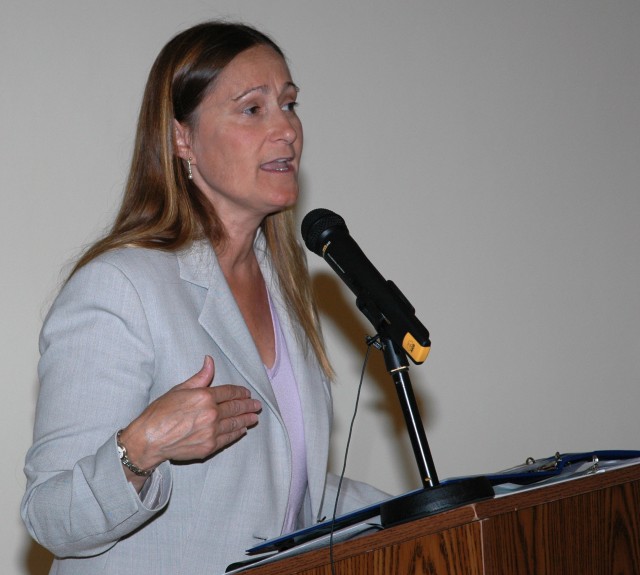HEIDELBERG, Germany - Installation Management Command-Europe Director Diane Devens headlined the U.S. Army Garrison Heidelberg Women's Equality Day observance Aug. 26 with a call for recognition of Army spouses.
Speaking in the Casablanca Room on Campbell Barracks, Devins also highlighted the value of mentoring and its reciprocal obligations.
"I'm going to focus my talk on the changes military spouses have made in my lifetime, and on my experience in advancing through the civilian ranks to the Senior Executive Service," said Devens. I'm an old Army brat who remembers a different Army, and the special efforts military spouses made back in the 60s and 70s."
Devens cited the example of her own mother, "...a great role model, a career Army spouse who hauled eight kids around the globe in a time when none of the programs families currently benefit from - ACS, Child Care, the Army Family Action Plan, the Army Family Covenant, and a host of others - were in existence."
Her father, a command sergeant major, had two tours in Vietnam and several unaccompanied tours. Devins recalled that in those days, when an enlisted Soldier or junior officer deployed on an unaccompanied tour, his family was forced to leave military housing.
"You just had to go home, wherever your home of record was," she said.
She said her mother held the family together through those experiences and several tours in Germany, Okinawa and a series of Stateside posts.
"And we all eight kids turned out to be successful adults - none of us are in jail - and my mom stayed sane," said Devens. "My mom is a real hero every sense of the word."
Devens said that Army spouses today play a huge role in determining what programs we have, and they influence the institution in a multitude of positive ways that her mother would only have dreamed possible 30 years ago.
"That didn't happen by chance, but through the pain and sacrifice and efforts of a great many women who fought for the changes that Army families now enjoy," said Devens.
She cited the case of Julie Moore, the wife of later Lt. Gen. Hal Moore, co-author of the bestselling book "We Were Soldiers Once and Young."
In 1965, her husband was a battalion commander whose troops engaged in a bloody battle in the Ia Drang Valley in South Vietnam. The families of soldiers killed in action were notified by telegram, delivered by taxi drivers.
"Through her crusading efforts on behalf of families," said Devens, "Army leadership instituted a new policy within two weeks of that battle, one requiring an officer and a chaplain to personally deliver casualty news."
Shifting gears, Devens then spoke of the value of mentorship.
"I think as a woman, my own career can serve as an example to those of women and men who mentor subordinates today, as well as subordinates who seek that mentorship," she said.
She recalled how she started as a GS-2 recreation aide at Letterkenny Army Depot in Pennsylvania in 1975, tried to go to college while working, "but it was too hard."
Everything changed when the depot hired a chief for the newly-established MWR program.
"Her name was Carol Beecher, and she was my first boss," said Devens. "I can honestly say that I wouldn't be here today if it were not for her mentorship.
Beecher encouraged her to return to college and for four years changed Devens' work schedule every semester to help her get her degree.
"I was not appreciative at the time," said Devens, who sometimes had to work weekends and nights to take classes.
"It was really cramping my partying style," said Devens to audience laughter.
She said Beecher would not let her give up.
"She was worse than my mother," said Devens.
"It took someone really pushing me to get me where I am today," said Devens. "...But for mentorship to work, it takes more than a strong mentor. It also takes a mentee who will listen and do what a mentor suggests."
"Success in a career comes at a price, and family sacrifice is sometimes part of the deal, ask any Army spouse," said Devens.
"I owe my own success in a large part to my husband," she said, recalling how he gave up the tenure track at the college where he was teaching to accompany her to Germany, a move that she said was critical in her later moving up the ranks.
She called that decision "proof that behind this successful woman is an excellent man!"
Devens wrapped up her remarks with observations on this year's focus on "women in the environment," citing the career opportunities in this new and emerging field.
"Today's observance is an opportunity for us all to acknowledge the leadership, commitment, and contributions of all who preserve this planet we all call home," said Devens.
Also as part of the observance, Heidelberg Arts and Cultural Center director Jen Bieser read an inspirational poem, and Jeanine Love, who called Devens "my hero," sang "Wing Beneath my Wings."


Social Sharing